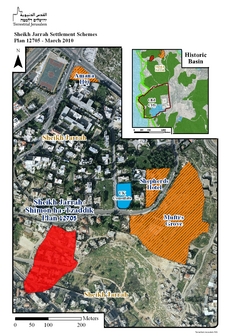 Special to APN from Daniel Seidemann and Lara Friedman
Special to APN from Daniel Seidemann and Lara FriedmanTwo "new" East Jerusalem settlement projects have hit the news in the wake of the Biden debacle - one for the Shepherd's Hotel and the other for the Shimon Ha-Tzaddik neighborhood of Sheikh Jarrah (Click here for a larger map of the area).
Shepherd's Hotel: As is now being widely reported in the Israeli and international press, Israel has issued permits for new settler construction in East Jerusalem.
The details are as follows: on March 18, 2010 the final permits were issued for the construction of 20 units for settlers at the site of the Shepherd's Hotel (a pdf of the actual permit is available here). According to the Municipality, the settlers applied for and paid the fees for the permits on March 15, 2010.
It should be recalled that the Shepherd's Hotel project was approved (final approval) in July 2009. Thus, barring intervention from the government of Israel, the project could have moved forward at any time since then - all that was needed was for the settlers to pay the fees and the issuance of the permits would be automatic.
That said, it is clear that the timing of the settlers' decision to move on this project at this time was neither coincidental or nor innocent. This is why we have been asserting for some months that the day after indirect talks were announced, there would be a provocation in Jerusalem, and it could well be bulldozers knocking down the Shepherd's Hotel.
